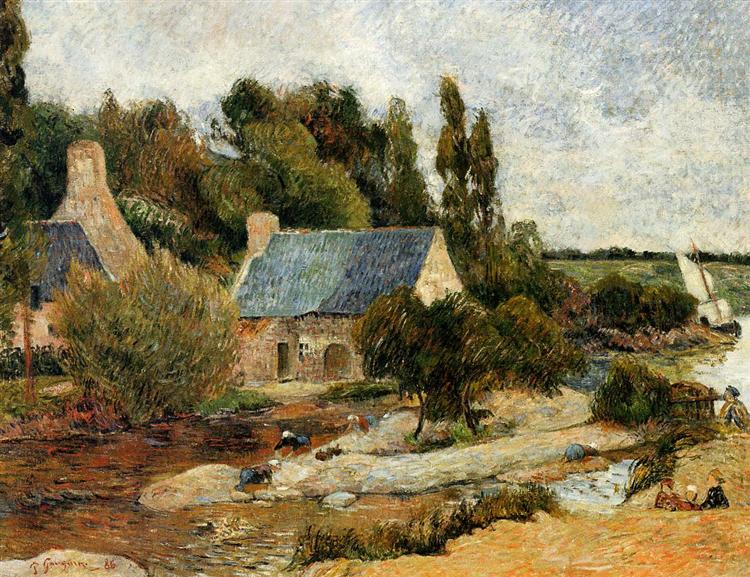Описание
In Washerwomen at Pont-Aven (1886), Paul Gauguin offers a vibrant and nuanced depiction of daily life in a small Breton village, capturing the essence of work and community in his distinctive post-impressionist style. The work reflects not only the artist's dedication to exploring local culture, but also his interest in the simplicity of rural life, both in its subject matter and visual treatment.
At first glance, the composition is clear and well-organized. Gauguin arranges the washerwomen on a horizontal plane that takes up most of the canvas, creating a sense of depth and movement. The central figure, standing in the water, is surrounded by other kneeling women, each focused on the task of washing. This arrangement not only emphasizes communal labor, but also suggests an intrinsic connection to the surrounding landscape: the washerwomen seem to emanate life and energy in a natural setting that, while picturesque, does not compete with the humanity of the work depicted.
Gauguin is known for his bold use of colour, and in this work he does not disappoint. Terracotta tones and resonant greens dominate the palette, creating a warm atmosphere that evokes both the freshness of the surroundings and the intimacy of the act of washing. Intense shadows and highlights enhance the forms, while colours are applied in an almost impetuously applied manner, suggesting an emotional approach to the depiction of the subjects. The combination of these colours conveys an almost symbolic feeling, inviting the viewer to contemplate the beauty in the everyday and, at the same time, to reflect on the life of the washerwomen, whose work, although arduous, is presented here with dignity and respect.
The characters in the painting appear to be symbols of the women of the region, with their traditional clothing including bonnets and cloths, typical of the Brittany area. This choice of costume is not merely decorative; instead, it offers a deep cultural connection, indicating the pride and identity of working women in that historical context. Their faces, while not detailed expressive, convey a certain introspection and desire for community, thus placing work in a broader socio-emotional context.
An interesting aspect of this work is that it belongs to an early phase in Gauguin's evolution as an artist. At this period, he was still influenced by Impressionism, but was beginning to move away towards a more personal and symbolic style. "Washerwomen at Pont-Aven" falls between Gauguin's earlier work and the more mature phase that would manifest in his later works in Tahiti, where his attention to figures and use of colour would become even bolder and more expressive.
When looking at “Washerwomen at Pont-Aven,” it is impossible not to feel a connection to the story of women who dedicate themselves to hard work. Gauguin, through this work, does not simply document a moment in time, but invites the viewer to appreciate the simplicity and beauty that can be found in everyday labor. This painting is therefore a testament to art’s ability to capture and elevate ordinary life to the plane of meaning and beauty, a theme that would resonate throughout Gauguin’s later career, while anchoring itself firmly in a rich and lived-in cultural tradition.
KUADROS ©, a famous painting on your wall.
Hand-made oil painting reproductions, with the quality of professional artists and the distinctive seal of KUADROS ©.
Painting reproduction service with satisfaction guarantee. If you are not completely satisfied with the replica of your painting, we will refund 100% of your money.

